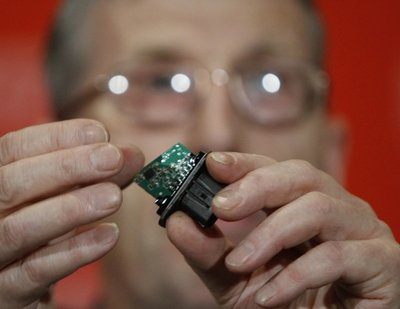Global General
Toyota will replace pedals for unhappy owners
(Agencies)
Updated: 2010-03-24 08:01
 |
Large Medium Small |
WASHINGTON – Toyota owners who are dissatisfied with the repairs to their vehicles covered by a massive recall to address sticky gas pedals can have replacement accelerator pedals installed, according to a memo the company sent to dealers.
 Dr. Anthony Anderson, an electrical failure expert, holds an electronic chip from an acceleration pedal assembly during a news conference at the National Press Club in Washington, Tuesday, March 23, 2010, to discuss Toyota’s sudden acceleration problems. [Agencies] |
The Japanese automaker said in a memo obtained Tuesday by The Associated Press that if a customer is unhappy with the feel of the accelerator after the car is repaired, dealers can provide a replacement pedal at no charge.
Dealers have been inserting a piece of metal into the gas pedal mechanism to eliminate friction that was causing the pedal problem on 2.3 million vehicles involved in a January recall.
| ||||
The memo, dated February 2010, said the pedal replacement "is based upon specific customer request only. Dealers are not to solicit pedal replacement." The memo was first reported by The New York Times.
Toyota spokesman Brian Lyons said owners received letters in February that mentioned they could receive a replacement accelerator pedal "if the customer is not satisfied with the appearance or performance" of their fixed vehicle. He said the memo was intended to tell dealers about "an improved parts-ordering process for the accelerator pedals" and didn't represent "a customer satisfaction policy change."
An AP review of government data found that more than 100 owners have complained to the government about problems with sudden acceleration after Toyota dealers fixed their vehicles. Toyota has said it is confident in its repairs and has found no evidence of other problems, such as faulty electronics.
Toyota has recalled more than 8 million vehicles globally over sticky pedals and accelerators that can become entrapped in floor mats, tarnishing the company's safety reputation and leading to government investigations and congressional hearings.
The memo addresses Toyota vehicles that were listed in the January recall. The vehicles include: the 2005-10 Avalon; 2007-10 Camry and Tundra; 2009-10 Corolla, Matrix and RAV4; 2008-10 Sequoia and 2010 Highlander.
"If a customer is not satisfied with the operation and/or the feel of the accelerator pedal after the reinforcement bar has been installed, please assist us by assuring a replacement pedal is provided at no charge to these customers," Toyota said in the memo.
The National Highway Traffic Safety Administration said it urged Toyota to make the new pedals available as an option because it wanted owners to get their cars fixed as soon as possible instead of waiting for new accelerators to be designed and manufactured.
Separately, a group of consumer advocates and electrical engineers said Tuesday that Toyota had discounted potential electronic problems in their recalled vehicles and the problem of sudden unintended acceleration in cars and trucks, while rare, was found throughout the auto industry.
"Electronics have weaknesses and can go wrong in many ways," said Dr. Keith Armstrong, a British electrical engineer and consultant on electromagnetic interference.
Armstrong and Clarence Ditlow, president of the Center for Auto Safety, urged Congress to require stronger design standards for electronics in vehicles and pressed the government to study potential electrical problems in vehicles. Transportation Secretary Ray LaHood has said his department intends to assemble a panel of experts to look at potential electromagnetic interference in cars and trucks that could cause unwanted acceleration.
Toyota has said it has found no evidence that electrical issues are behind the recalls. Kristen Tabar, an electronics general manager with Toyota's technical center in Ann Arbor, Mich., said in a video clip posted by the company on Monday that the automaker has eight labs in Japan that it uses to bombard vehicles with electronic interference.
She said Toyota ensures that "every system in the vehicle operates properly under those conditions."










